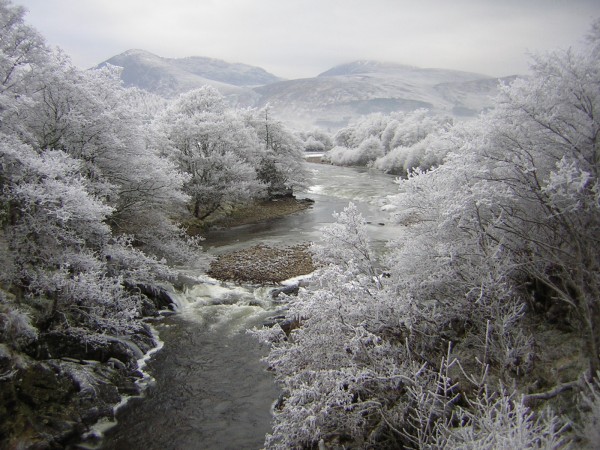Beinn Uais /Ben Wyvis
Faclan Gàidhlig anns a’ Bheurla – Gaelic words in English
Ged a tha fios againn gu bheil faclan Gàidhlig, no le tùsan Gàidhlig, anns a’ Bheurla Albannaich, cha bhi sinn an-còmhnaidh mothachail air an uiread a tha dhiubh no gun lorg sinn cuid mhath eile anns a’ Bheurla Shasannaich fhèin. Bidh iad air an sgrìobadh air dòighan rud beag eadar-dhealaichte, ’s dòcha, ach ’s urrainn dhuinn an aithneachadh.
’S ann am measg feartan na tìre a lorgas sinn a’ mhòrchuid de na faclan air a bheil sinn uile eòlach. Chaidh iadsan a-steach do chleachdadh cumanta, fiù ’s ann an Sasainn, tron shealladh romansach den Ghàidhealtachd – tìr àlainn ach gharbh – a bha aig na Bhictorianaich, an ìre mhath tro na nobhailean le Sir Walter Scott. Bha loch, glen agus strath, ben agus cairn, na b’inntinniche agus na bu romansaiche na lake, valley, mountain agus pile of stones. ‘S e cuspair gu h-àiridh farsaing is inntinneach a th’ ann an ainmean-àite fhèin, ach b’ fheàrr dhomh sin a chumail airson artaigil eile!
An uair sin thàinig na h-oighreachdan mòra anns a’ Ghàidhealtachd agus còmhla riutha an luchd-spòrsa agus an gillies, a’ coiseachd tro bogs, ag iasgaidh anns na burns, a’ sealg nan capercaillies agus na dàimh, an dòchas caberfeidh fhaighinn aig deireadh an latha. Agus as an dèidh-san thàinig na streapadairean, agus bha iadsan gu math eòlach a dh’aithgheàrr air faclan mar corrie, crag, agus sgur.
Ach tha faclan Gàidhlig ann a bhuineas don chultar agus dhualchas againn cuideachd, mar bard, pibroch, clarsach, puirt a beul agus ceilidh, far am bi sporran, plaid, agus brogues oirrn, agus aig na geamannan bidh sinn a’ sadadh cabers fhathast seach poles. Tha ar n-uisge-beatha ainmeil fon ainm whisky air feadh an t-saoghail gu lèir, còmla ris na h-abairtean freagarrach: dram, slug, doch an doris agus slàinte! Agus chan fhaod sinn ar cliù mar shaighdearan tapaidh a dhìochuimhneachadh nas motha, leis na claymores agus skean dubhs agus na slogans a’ bhlàir.
Ach tha faclan-iasaid eile ann nach eil cho follaiseach. ’S dòcha gu bheil fios agaibh mu galore agus smashing, ach am biodh sibh a’ twig gur e faclan Gàidhlig (air tùs), an ìre mhath cinnteach, a th’ ann an pet, shanty, smidgeon, gob, grotty, agus snazzy? Bithear a’ smaoineachadh gun tàinig abairtean mar sin a-steach dhan chànan Bheurla nuair a dh’imrich uiread de Ghàidheil dha na bailtean mòra ann an Alba agus Sasainn, am measg nan Sassenachs, airson obair fhaighinn, agus mar bhuill Feachdan na Dùthcha – ’s ann bhon tùs sin a thàinig am facal spunk gun teagamh!
glen gleann – valley
strath srath – wide river valley
ben beinn – mountain
cairn càrn – heap, pile
gillie gille – boy, servant
bog bog – soft; boglach – a bog, marsh
burn burn – water
capercaillie capall-coille –‘wood-horse’
caberfeidh cabar-fèidh – ‘deer-horn’
corrie coire – kettle
crag creag – cliff, rock
sgur sgùrr – peak
bard bàrd – poet
pibroch pìobaireachd – piping
clarsach clàrsach – harp
puirt a beul puirt-a-beul – ‘mouth tunes’, mouth-music
ceilidh cèilidh – visit, get-together
sporran sporan – purse
plaid plaide – blanket
brogue bròg – shoe
caber cabar – pole, rafter
whisky uisge-beatha – water of life
dram dràm or drama – dram
slug sluig – gulp, swallow, swig
doch an doris deoch an dorais – ’door-drink’
slainte slàinte – health
claymore claidheamh mòr – big sword
skean dubh sgian dubh – black (‘secret’) knife
slogan sluagh-ghairm – ‘summoning the hosts’, battle-cry
galore gu leòr – enough, plenty
smashing ’s math sin! [sma-shin] – that’s good!
twig tuig – understand
pet peata (old)– a spoilt child, a favourite
shanty seann taigh – old house
smidgeon smèidean (old)– little nod, wink, sign
gob gob – beak, bill, bird’s mouth
grotty grod – ugly, dirty
snazzy snasail – smart, dapper
Sassenach Sasannach – Saxon, English
spunk spong –spongey firelighting material > courage
***
Although we know there are words of Gaelic origin in Scots English, we are not always aware of how many there are, nor that there are lots in ‘English English’ too. They may be spelled a bit differently, but they are still recognisable.
The best-known ones are names for geographical features, many of which came into more common English usage with the Victorians’ love of the image of the wild, romantic Highlands, fuelled by Sir Walter Scott – ben, glen, strath, cairn etc were much more evocative than mountain, valley or pile of stones. (I’d better keep the whole fascinating field of Gaelic in place-names for another time!)
With the creation of the large sporting estates in the Highlands came the southern hunting, shooting and fishing brigade with their gillies, angling in the burns, tramping across bogs, bagging the capercaillies or even a deer, to show off the caber-feidh. And after them came the climbers, who were soon sprinkling their tall tales with terms like corrie, crag or sgur.
But of course there are lots of Gaelic words used in English in connection with our own traditions too: you might hear a bard, or a pibroch or clarsach, or puirt-a-beul, at a ceilidh, and you might be wearing a plaid, a sporran and brogues. At the Games we still toss cabers, not poles. And of course whisky is known around the world, along with the appropriate expressions: dram, slug, doch an doras, and slainte! And let’s not forget the tradition of brave fighting Highlanders, with their claymores, skean dubhs and battle slogans.
But there are less obvious loan-words too. You may know about smashing and galore, but had you twigged that these too are definitely or likely to be of Gaelic origin: pet, shanty, smidgeon, gob, grotty, snazzy? It’s thought that they came into English with the movement of Gaels to the big cities of Scotland and England (among the Sassenachs) looking for work, and through the large numbers of Scots in the Armed Forces. No doubt that’s how the word spunk entered the language!



